Structures & Construction Materials
We offer a wide range of mechanical, physical and chemical examinations of construction materials, structural members and structures. We are specialised in the fields of concrete, specialty concretes, reinforced and prestressed concrete, sealing and concrete repair products, gypsum building materials, as well as reinforcement technology, tensioning systems and stay cables for bridges. The examinations are conducted in an amply equipped laboratory. We also examine structures on site with mobile equipment, which also includes non-destructive examinations.
MPA Braunschweig furthermore provides external monitoring services to manufacturers of construction materials and structural members, which is done either at their place of production or on construction sites. We provide support in case of technical questions to manufacturers of construction materials, constructors and authorities. We also prepare expert opinions and assist our customers in the application procedures for European Technical Approvals, general technical approvals and type approvals.
Head of Department Structures and Construction Materials

Structural members and special structures
Mechanical tests of structural members and special structures takes place both in our laboratory and on-site.
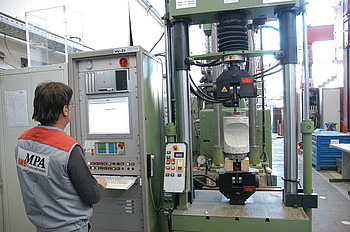
- Test load
- Protection against falls
- Loadbearing capacity / residual loadbearing capacity
- Bending loadbearing capacity
- Compressive and tensile strength
- Pendulum impact tests
The examinations and tests are carried out on different materials and structural member types.
- Ceiling substructures, suspended ceilings, ceiling coverings
- Lightweight partition wall constructions
- Wood and engineered wood products
- Glass structures
- Thermal insulation composite systems (ETICS) and façade structures

Your contact persons


Testing of construction materials
Testing of construction materials in the context of approval procedures or CE marking, examinations in case of damage (e.g. ASR, subsequent determination of fire temperature), durability prognoses
- Testing and monitoring of natural construction materials (aggregates, natural stone, bricks, aerated concrete bricks, concrete building blocks, tiles)
- Testing and monitoring of binding agents and concrete additives (cement, lime, gypsum, flue ashes, slag sand)
- Testing and monitoring of mortars
- Durability testing of construction materials (e.g. ASR)
- Research collaborations

Building Chemistry
Chemical and mineralogical analysis of materials, among others for material characterisation and identification in the context of construction material testing, monitoring and analysis of structural damage
- Analysis of materials and their chemical-mineralogical description
- Testing and monitoring of mineral and organic construction materials such as cement, lime, gypsum and aggregates
- Testing of concrete additives, e.g. slag sand, trass, flue ash, powdered limestone
- Analysis of materials as part of the investigation of structural damage, e.g. in case of discolorations or efflorescence
- Simulation of mass transfer in mineral construction materials and estimate of the durability of construction materials in case of chemical-mineralogical attack
- Consulting in the area of mineral construction materials

In addition to construction material testing, structural damage analysis and monitoring, research is another important field of activity.
- Testing of cement-bound construction materials in contact with saline solutions
- Expansion in base courses without bonding agents when using recycled construction materials made of concrete
- New, innovative concrete additives
- Impact of exposure to fire on the chemical-mineralogical cement phases of concretes
A list of our publications and conference contributions can be accessed here.
Building physics
Testing and assessment of construction physics questions. The focus is on thermal construction physics, as well as the complex interaction of thermal and hygric influencing factors.
- Determination of the thermal conductivity of construction and insulating materials
- Tests and monitoring of insulating materials Determination of water vapour diffusion and moisture transport in construction materials
- Moisture measurements of construction materials and in structures

Your contact persons


Sealing of structures
Testing of construction products for the sealing of roofs, structures and façades
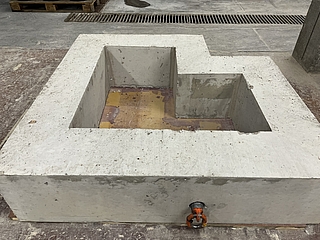
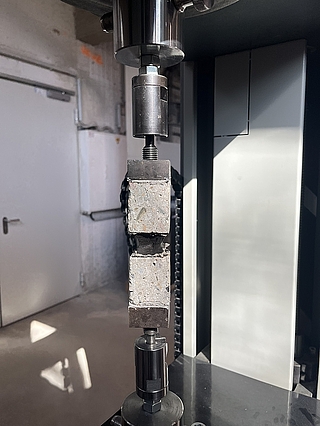
- Flexible plastic and elastomer sheeting
- Bituminous sheeting
- Compound seals for fresh concrete
- Sealing products for liquid application
- Roofing or sarking membranes
- Plastic and elastomer vapour barriers
- Bituminous vapour barriers
- Plastic and elastomer damp proof courses
- Bituminous damp proof courses
- Mineral sealing slurries
- Flexible polymer-modified thick coatings
- Plastic-modified bituminous thick coatings
- Sealings in connection with tiles and paving tiles
- Expansion joint sealing strips
- Injection hose systems
- Coated seam sheets
- Exterior strip-type seals
- Thermoplastic joint tapes
- Elastomer joint tapes
- Joint sealants
- Joint fillers and sealants
- Geosynthetic flexible sheets for waterproofing
Tests on construction products for sealing in constructions for storage, filling and handling of water endangering liquids
- Coating materials
- Coating systems
- Interior coatings and rubber coatings
- Plastic sheetin
- Sealing constructions such as joint sealants, concrete, precast concrete blocks, concrete slabs, joint tapes, joint sealants, plastic-modified repair mortars, crack fillers
Technical planning and supervision of the implementation of sealing measures (main focus: subsequent injection sealing)
External monitoring of sealing measures
External monitoring or certification of factory production control
Creation of expert opinions in relation to sealing of roofs and structures
Repairs
- Tests on construction products for the protection, repair and reinforcement of concrete structures
- Surface protection systems for concrete (DIN EN 1504-2, DAfStb (German Committee for Reinforced Concrete) directive; ZTV-ING)
- Crack fillers (epoxy resins, polyurethane resins; cement suspension, cement paste and gels) for the load-carrying, flexible and swellable filling of cracks and defects (DIN EN 1504-5, DAfStb directive; ZTV-ING)
- Repair concretes/mortars (DAfStb directive; ZTV-ING)
- Coating materials for steel surfaces for repairs (DAfStb directive)
- CFRP brackets (approvals by the DIBt (German Institute for Construction Technology))
- Glues for construction purposes (DIN EN 1504-4, DIBt approval regulation)
- Acceptance of certificates of suitability of specialist companies for the design of reinforcements for structures (bracket reinforcements) and for the gluing of façade panels
- Creation of restoration concepts and technical implementation support in relation to the protection and repair of structures
- External monitoring of repair measures in accordance with DAfStb directive and ZTV-ING
- External monitoring or certification of factory production control
- Creation of expert opinions in relation to the protection and repair of structures
Your contact persons


Development, testing and monitoring of concretes and mortars
Recipe development for concretes
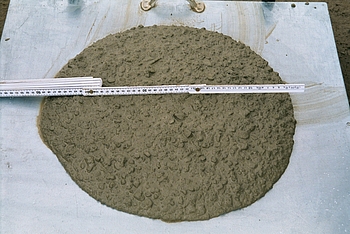
- Concretes for solid structures to avoid the formation of forced cracks during setting
- High performance concretes and ultra-high performance concretes (UHPC)
- Steel fibre concretes, for underwater concrete, among others
- Sprayed concretes
- Lightweight concretes
- Special concretes, such as salt concretes for mines
- Mortar, screed and plasters
External monitoring or independent verification checks
- Ready-mixed concrete, factory-made wet mortar and dry mortar
- Precast elements made of reinforced and prestressed concrete
- Concrete in monitoring classes on construction sites
Suitability and quality testing of concretes
Your contact persons


Examinations of structures

Examinations of structures in a wide range of aspects
- Examination of loadbearing capacity (resistance), structural integrity and durability of structures including damage assessment
- Creation of expert opinions and restoration concepts
- Sampling for laboratory analysis, e.g. to determine compressive and tensile strength, carbonation depth, chloride content, and to test frost resistance
- Locating of reinforcement and tendons in structures, e.g. using georadar, ultrasound
- Test loads on structures
- Endoscopic examinations
- Damage assessment in case of alkali-silica reaction (ASR)
- Measurements and monitoring of structures
- Examination of wooden structures, e.g. laminated beams and in case of insect and fungal attack
- Examination of structures after exposure to fire

Your contact persons


Reinforcement technology and tensioning systems
Processing a range of questions on static and dynamic loads in relation to reinforcement, prestressing steel, tensioning systems and cable systems:
- Tests on tensioning systems and cables (among others, in accordance with ETAG 013, fib guidelines, PTI recommendations)
- Testing of prestressing steel, concrete steel, fibre reinforcement
- Creation of expert opinions for steels and pretensioning systems or cable systems
- Monitoring of concrete steel, prestressing steel, steel fibres, micro piles and tension piles
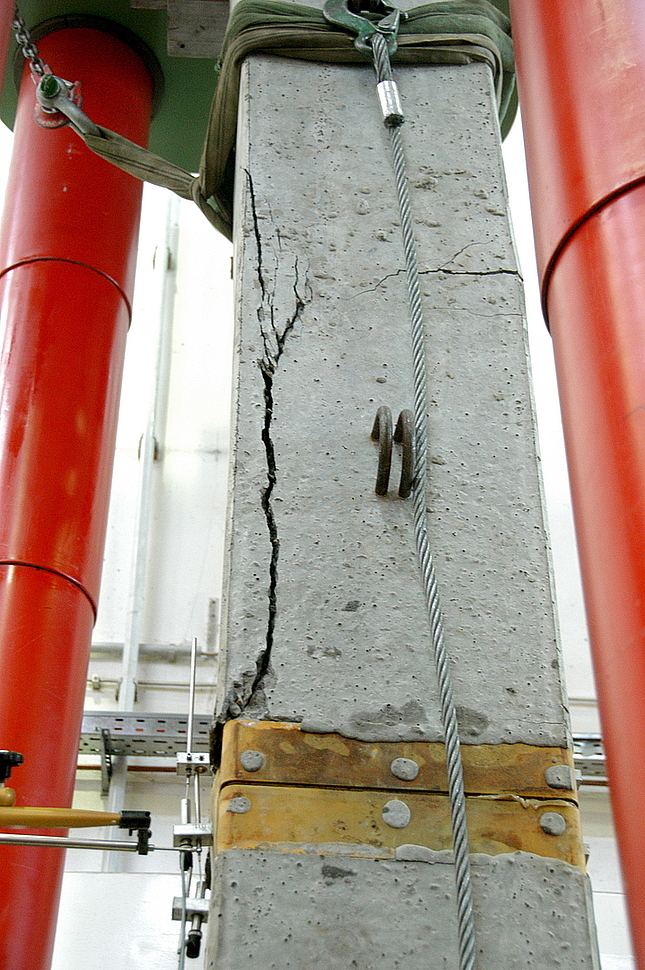
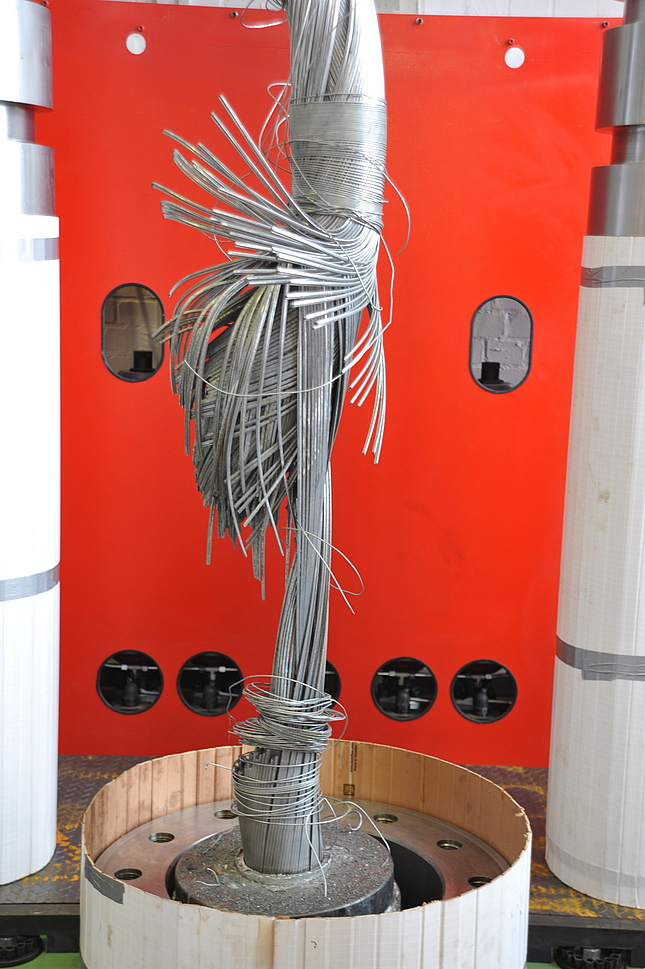
Your contact persons

